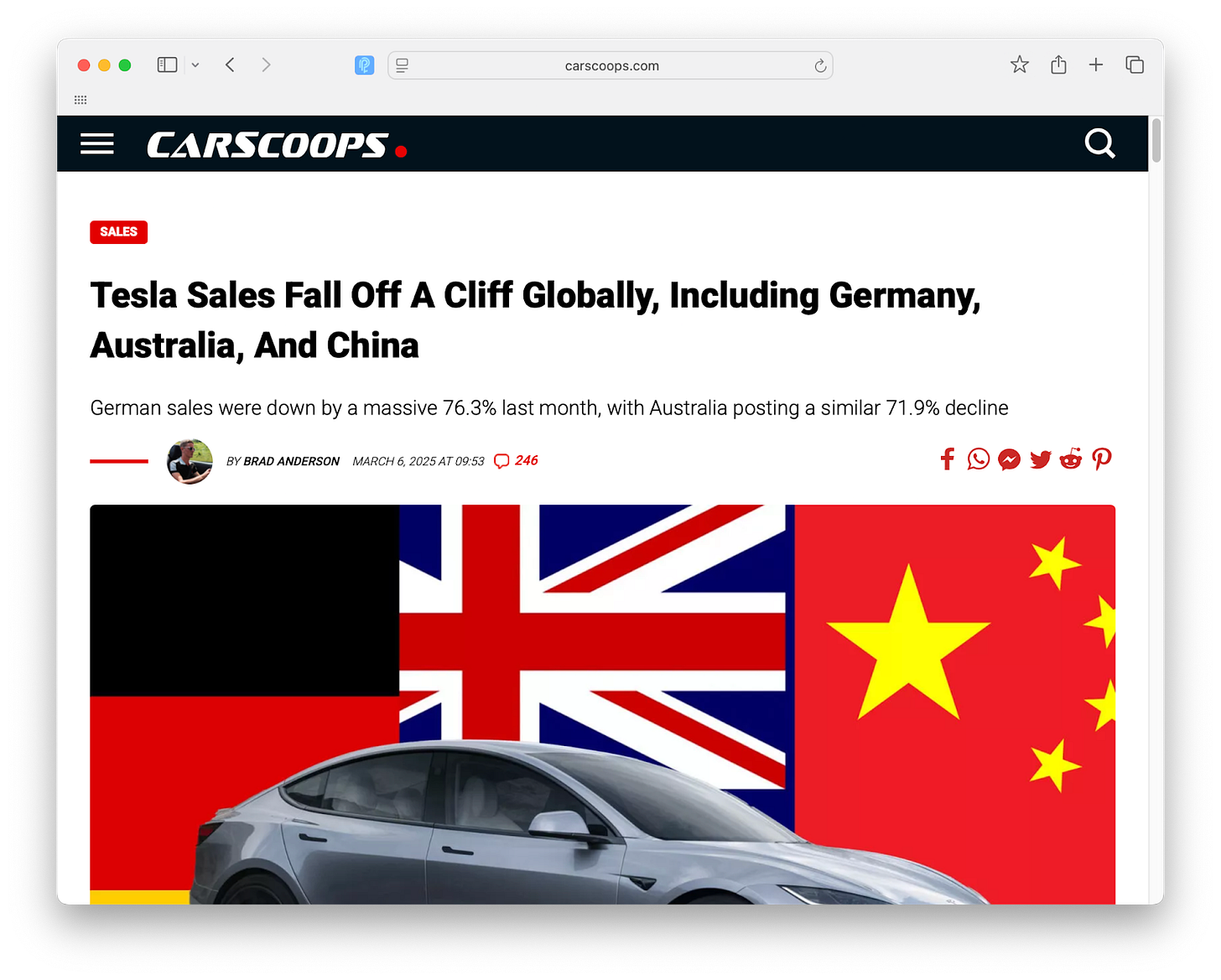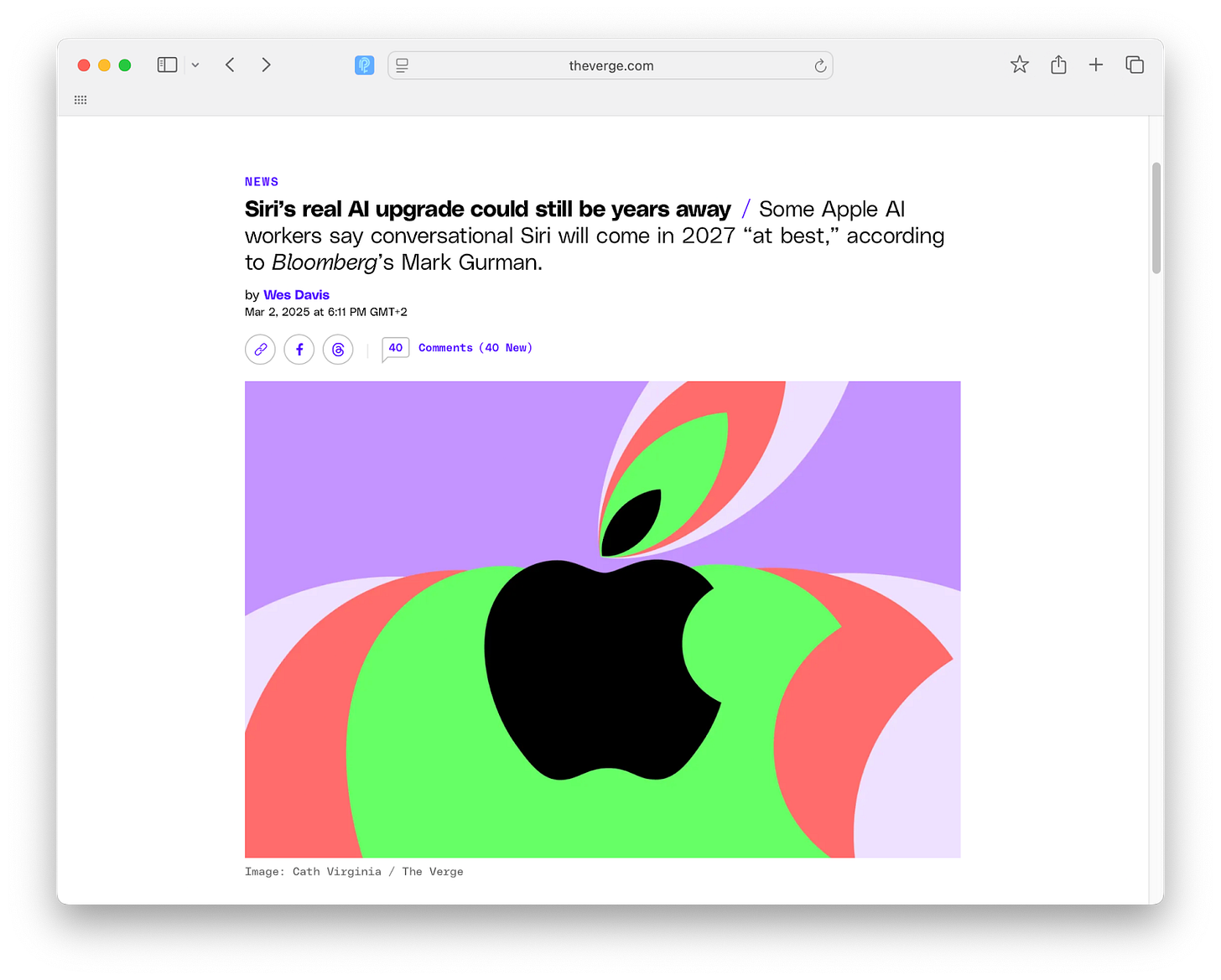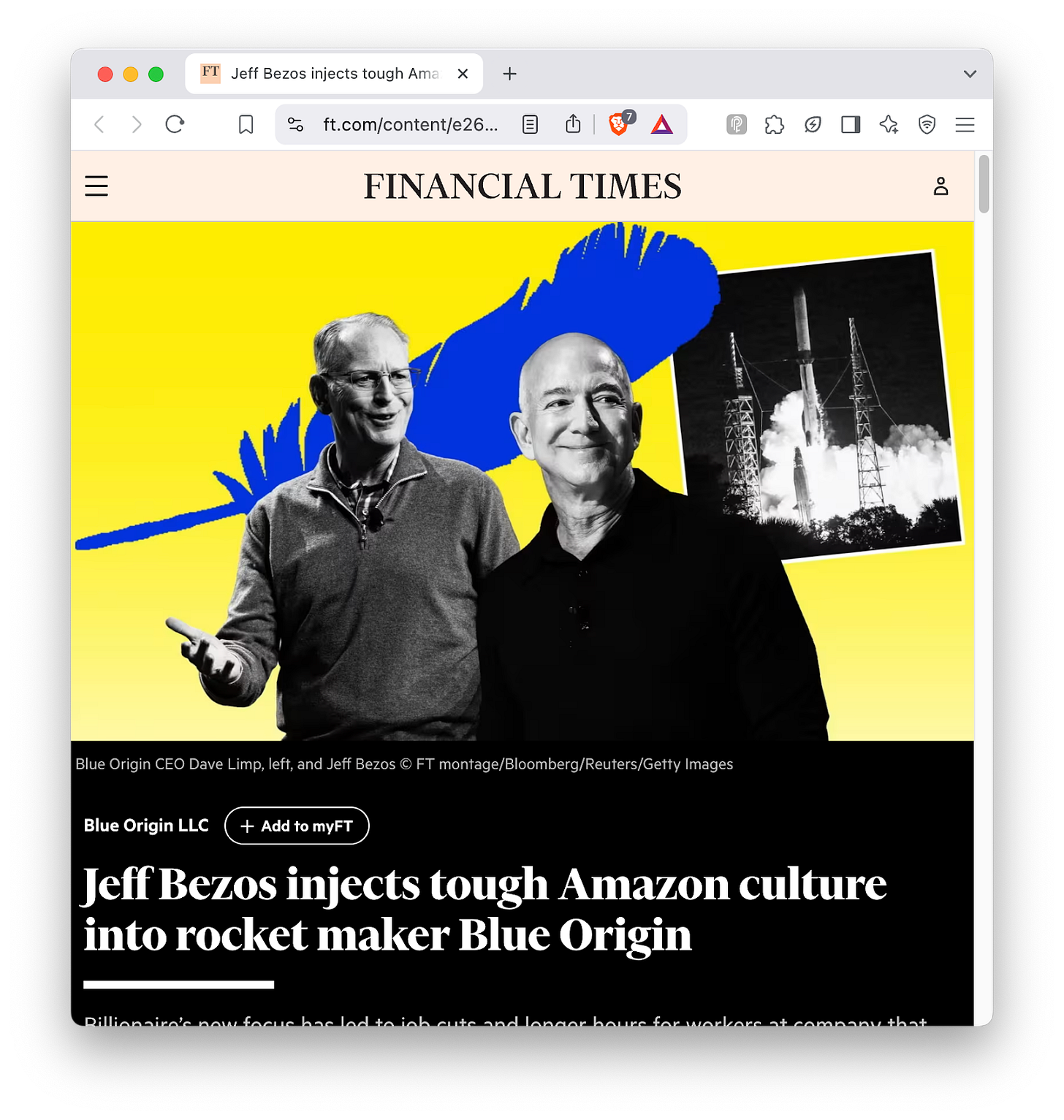(#116) The fall of Tesla and the rise of Elon Musk - the villain
Apple’s struggle with AI Siri
This week, from the business point of view, things have been calm. Too calm, maybe. That’s why I present only three stories (companies):
The fall of Tesla and the rise of Elon Musk, the villain
Apple’s struggle with AI Siri
Jeff Bezos brings the Amazon culture into rocket maker Blue Origin
The fall of Tesla and the rise of Elon Musk, the Villain
1/ Elon Musk has always been a polarizing figure, but over the last few years, he has actively transformed himself from a visionary entrepreneur into a full-fledged political disruptor. Once hailed as the man who would lead the world into a sustainable future, Musk is now better known for spreading misinformation, amplifying far-right conspiracy theories, and picking fights with governments that regulate his businesses. His increasingly erratic behavior isn’t just tarnishing his reputation, but also it’s actively hurting Tesla. The latest sales data from Europe, Australia, and China shows a steep decline, with Germany reporting a 76% drop in Tesla sales. Yes, competition is there, but this it’s about a CEO who has alienated customers and policymakers alike.
2/ For years, Tesla rode the wave of innovation, government incentives, and Musk’s cult of personality. But now, those advantages are evaporating. Many European governments, including Germany’s, have begun rolling back EV subsidies, making Tesla’s price-sensitive customers look elsewhere. Meanwhile, Musk has engaged in outright antagonism toward European regulators, from Brussels to Berlin, spreading false claims about their policies and painting them as authoritarian overreach. His attacks on Germany’s government coincide with Tesla’s cratering sales in the country, down 70% year-over-year. Customers vote with their wallets, and it turns out that even die-hard Tesla fans don’t want to buy cars from a company whose CEO trashes their country.
3/ Musk’s obsession with politics has not only hurt Tesla’s brand, but it has distracted him from running the company properly. Instead of focusing on improving Tesla’s aging vehicle lineup and addressing quality control issues, he’s busy feuding with regulators, unions, and entire nations. While competitors like BYD and and other Chinese manufacturers are launching fresh EV models at competitive prices, Tesla’s Model Y (its supposed best-seller) is struggling amid production delays and minimal innovation. Meanwhile, China, Tesla’s most crucial growth market, saw a 49% decline in sales in February. If the manufacturing plant IS the product, it seems many companies in China have this product. (see Newsletter #70 about manufacturing in China)
4/ In a way, Musk’s political transformation is eerily similar to that of other billionaires who lost their core business focus. Much like how Mark Zuckerberg pivoted from building a social network to pushing an unpopular metaverse vision, Musk seems more interested in wielding influence and power than making great cars. Whether it’s his embrace of conspiracy theories on X or his habit of signal-boosting extremist content, Musk’s erratic leadership is making Tesla less attractive to mainstream consumers. EV buyers are no longer just choosing between brands, but they’re choosing whether or not they want to be associated with Musk’s worldview.
5/ The biggest risk for Tesla isn’t just a bad quarter or two, it’s the long-term erosion of trust. Governments, once Tesla’s biggest allies, are now wary of Musk’s unpredictability. Customers who once saw Tesla as a bold choice are now looking at other options. And investors who believed in Musk’s brilliance are realizing that he might be more interested in being a political figure than a CEO. Tesla’s stock price might not collapse overnight, but the slow decline in sales, reputation, and relevance is already well underway.
The question is no longer whether Musk is harming Tesla it’s whether he’s willing to stop before it’s too late. LINK
Apple’s struggle with AI Siri
Two ideas on this topic that evolve each week and put Apple in a worse position:
1/ Apple’s inability to bring real AI to Siri is an embarrassing display of bureaucratic inertia and strategic miscalculation. While OpenAI, Google, and even Amazon have managed to integrate generative AI into their products, Apple is still fumbling around with maybe delivering a properly conversational Siri by 2027, IF everything goes right . Reports indicate that internal leadership at Apple is deeply skeptical of their own AI team, which is apparently struggling to even get enough compute power to train models. And while Apple fans might shrug this off as Apple’s trademark “perfectionism,” the truth is much simpler: Apple was caught completely off guard by AI, and now it’s scrambling to catch up with duct tape and press releases.
2/ It’s not like Apple didn’t see AI coming. They’ve had a decade to turn Siri into something useful, but instead of innovating, they let it rot into a glorified voice memo app. Now, in 2025, they’re still making vague promises about AI-powered upgrades that keep getting delayed because their own executives don’t think the product works . And let’s not forget that Apple Intelligence, the thing that was supposed to fix Siri. is still just a fancy brand name with no actual product attached. Meanwhile, ChatGPT, Gemini, and even Amazon’s Alexa+ are improving in real time. The Apple of the past would have waited to launch AI until it was seamlessly integrated. Today’s Apple is just waiting because they don’t know what else to do. LINK
Jeff Bezos brings the Amazon culture into rocket maker Blue Origin
1/ Jeff Bezos is turning Blue Origin into Amazon 2.0, and not in a good way. After years of falling behind SpaceX, he’s decided the solution isn’t better engineering or a clearer strategy, it’s longer hours, aggressive targets, and layoffs . He’s hired a wave of former Amazon executives, introduced 50-hour work weeks, and even installed badge scanners to track employee time, because nothing fuels innovation like micromanagement. The result? A company that’s still nowhere near catching up to SpaceX but now has the charming workplace culture of an Amazon fulfillment center.
2/ The real issue isn’t just the tough work environment, it’s that Bezos is chasing speed at the expense of execution. Blue Origin’s New Glenn launch in January failed to recover its booster, but instead of prioritizing reliability, leadership is pushing for more launches, more quickly. Meanwhile, SpaceX continues to dominate commercial spaceflight and Starlink revenue, making Blue Origin’s business model look even shakier. Bezos wants his space empire to move faster, but forcing Amazon-style efficiency onto rocket science might just make Blue Origin’s next failure even bigger. LINK
I just launched my book on strategy…and now it is back in stock.
Through 28 chapters, I covered three parts: (1) Strategy, (2) Innovation & Growth, and (3) Generative AI.
See a full sample - the chapter on Network Effects. - click HERE







